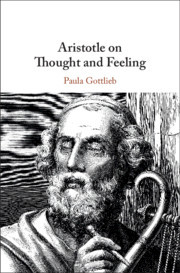Description
Aristotle on Thought and Feeling
Author: Gottlieb Paula
Argues that Aristotle provides an account of the interdependence of feeling, desire, and thought that is sui generis.
Language: English
Subject for Aristotle on Thought and Feeling:
Publication date: 01-2021
300 p. · 23x15 cm · Hardback
300 p. · 23x15 cm · Hardback
Description
/li>Contents
/li>Biography
/li>
Aristotle's discussion of the motivation of the good person is both complicated and cryptic. Depending on which passages are emphasized, he may seem to be presenting a Kantian style view according to which the good person is and ought to be motivated primarily by reason, or a Humean style view according to which desires and feelings are or ought to be in charge. In this book, Paula Gottlieb argues that Aristotle sees the thought, desires and feelings of the good person as interdependent in a way that is sui generis, and she explains how Aristotle's concept of choice (prohairesis) is an innovative and pivotal element in his account. Gottlieb's interpretation casts light on Aristotle's account of moral education, on the psychology of good, bad and half-bad (akratic) people, and on the aesthetic and even musical side to being a good person.
Introduction; 1. The psyche; 2. Aristotelian feelings; 3. Developing thought and feeling; 4. Aristotelian choice; 5. Akrasia; 6. Thoughtfulness and feelings; 7. To kalon and music; Conclusion.
Paula Gottlieb is Professor of Philosophy and Affiliate Professor of Classical and Near Eastern Studies at the University of Wisconsin-Madison. She is the author of The Virtue of Aristotle's Ethics (Cambridge, 2009) and of numerous articles, including the entry on Aristotle on noncontradiction in The Stanford Encyclopedia of Philosophy.
© 2024 LAVOISIER S.A.S.




